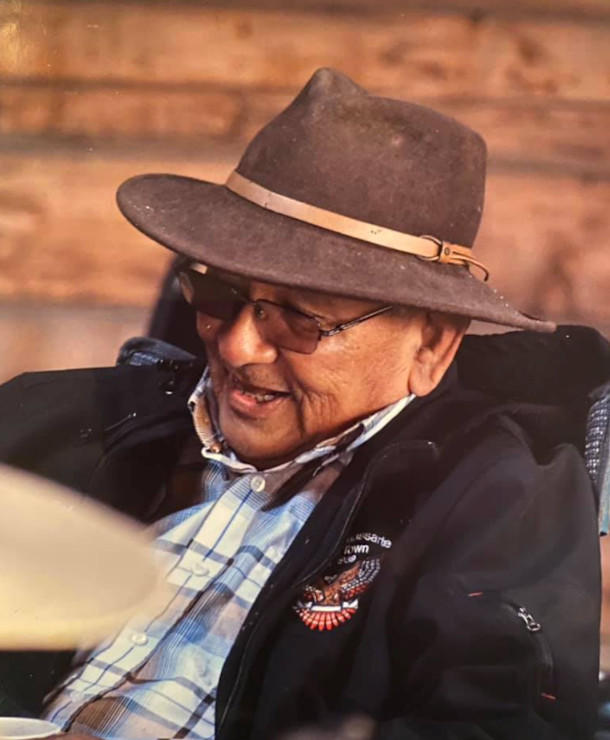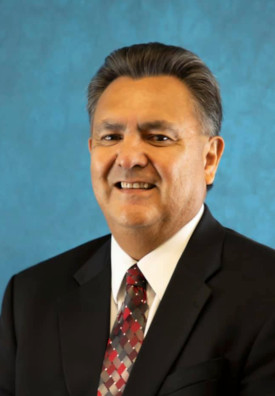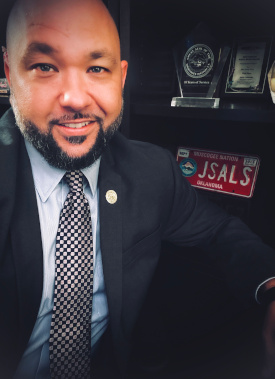COVID Risk for Tribal Cultures
Air Date: Week of January 29, 2021

Miko Robert Lee Yargee was the chief of the Alabama ceremonial grounds. He carried Muscogee Creek ceremonies such as the yearly Green Corn Ceremony. He passed away from COVID-19 in 2020. (Photo: Courtesy of Jason Salsman)
Native American communities have been hit especially hard by the Covid-19 pandemic, with nearly twice the mortality rate of white Americans. The deaths of tribal elders are also leading to losses of language and other cultural knowledge. Jason Salsman, the Press Secretary for the Muscogee Creek Nation, speaks with Host Bobby Bascomb about how Covid-19 has affected his community and why elders are first in line for vaccination.
Transcript
BASCOMB: As Winona mentioned, pipeline construction is bringing workers from around the country to Native American communities where the coronavirus pandemic has been especially deadly. The mortality rate for native peoples in the US is nearly twice that as for whites. Across the board the virus is most dangerous for older people and for many Native American groups losing elders means more than just losing a loved one it’s also a loss of culture, tradition, and language.
[MUSCOGEE LANGUAGE]
BASCOMB: For many tribes, including the Muscogee of Oklahoma, there are less than a thousand people remaining who can speak the native language fluently and they are typically the elders. So, when deciding who should be first in line to receive the vaccine many tribal communities are prioritizing their elders in a bid to save the language and culture. Jason Salsman is a spokesperson for the Muscogee Creek nation in Oklahoma. He says the cultural loss to Covid has been devastating.
SALSMAN: That is what has hurt our community the most is the fact that it's not who we lost. It's what we've lost. It's a knowledge and experience in the spirit that went away with these people that we've lost, that really hurts our community and that's why it's affected us a little bit differently. You know, we are unique, we do have cultural markers that make us different. And I think it's because of that is why this has been a different experience for us. Much more sobering experience for us, then then maybe a lot of different groups.
BASCOMB: Well, can you give us an example, please, of some of those cultural traditions that that were lost this year with the passing of some of your elders.
SALSMAN: So at Muscogee Creek Nation, our traditional and ceremonial livelihood centers around the 16 remaining ceremonial fires that are still at the ceremonial grounds. I mean, this is directly given to our people from the Creator. When you talk about ceremonial folks and what they do at the ceremonial grounds. They're taking traditional medicine, they're doing stomp dance, they're singing songs, there's the ceremonial fire. There's all of this knowledge out there. And more importantly, all of that ceremonial knowledge is not put in a textbook. Because a publisher can manipulate the content of a textbook, we know that better than anybody else. It's not broadcast out on television. It's not broadcast out on radio, because guess what, in television, there's a rights holder somewhere. There's somebody that has the creative control over those things. So the ceremonial and the traditional knowledge are things that are kept at the grounds, oral tradition, oral histories passed from person to person, that information, that knowledge is kept inside of those people and because of that, when we lose them, it goes too.

Dr. Robert Bible was the President of the College of Muscogee Nation (CMN) and left a legacy for his contributions to American Indian higher education efforts. Dr. Robert Bible passed away from complications due to COVID-19 in December 2020. (Photo: Courtesy of Jason Salsman)
BASCOMB: Could you tell me the personal story, if you're comfortable with that of someone you lost to the virus and what that meant to you personally, and to your community.
SALSMAN: Speaker Sure, amm. You know, here at the Muscogee Creek Nation. We're one of the few tribes in America that have an accredited tribal college, one of the persons spearheading the efforts to get the college not only built and established, but accredited was Dr. Robert Bible. And he was the president of the college of the Muscogee nation. And Mr. Bible was somebody that everyone knew in in the Muscogee Creek community, he was somebody that was a champion for tribal education, but also was a member of the Chiefs cabinet as part of the leadership team. Unfortunately, Mr. Bible contracted the Coronavirus, and had a pretty serious case of it. He was in the hospital. And I think it just a day after he was released from the hospital, he passed away at his house. The fact of the matter is we lost him. And it was devastating. He was a Well, excuse me, he was a well loved man. And it's a real shame that he's not with us anymore. Because he would love to see all of the dreams he had for the college come to fruition. I think he will in some form or fashion but it would just be great for him to still be here. A lot of people miss Robert so it's tough to talk about still. That's an example of somebody that was in the education community. We just lost Miko Robert Yargee, to this virus. And when I say Miko that is translated as town King, or basically chief of his ceremonial ground. He was the Miko of the Alabama tribal town, or ceremonial ground, and Miko Yargee he was somebody that in the traditional world was so well respected. You know, he was mild mannered, and he spoke sparingly but when he spoke, everybody gathered around to listen, it was very much a cultural icon in the Muscogee Creek Nation. And he was one that would reach out and speak with younger people and let them know this is why you're Muscogee. This is why you speak this way, this is why we meet out here. This is what we're all about to lose somebody like him. It's almost like you're burning a textbook, because Miko appointments are for life. I mean, he started at a young age, almost in a way almost betrothed to his position. You know what I mean? As a Miko in the ceremonial world. And so for him, think about that, you know, he's over 60 years old. So how many years of tradition every summer out in the ceremonial ground, the green corn ceremony knowledge that absolutely can't be found anywhere else on the earth. I mean you can scour the globe. And it's very specific to this area and this culture. So to lose that it's devastating.
BASCOMB: Oh gosh I'm so sorry for your loss I really am. I've read that some tribes, including the Cherokee are choosing to prioritize elders and specifically native language speakers when distributing the vaccine. To what degree were you thinking about elders and native language speakers when deciding who would be first in line for the vaccine in the Muscogee Creek Nation?

Jason Salsman is the spokesperson for the Muscogee Creek Nation. (Photo: Courtesy of Jason Salsman)
SALSMAN: Yeah, the elders and the native language speakers where in tier one, phase one. I mean, if you could put the tippy top whatever you want to call it, they were the absolute priority. And it's because like I said, that is our distinct cultural marker. You can go to Mexico, you can go to New Hampshire, you can go to India, and nobody's speaking, Muscogee Creek language, they're speaking it here, because they're Muscogee people here. And that's why we have to preserve that. They need to be able to be here to teach that to our younger ones, to immerse them in the language. Who are we, if we don't know how to speak in our own language to one another, we're not Muscogee Creek if we can't speak. And so we're trying our best to not only convey the seriousness of getting those folks vaccinated, but at the same time, the seriousness of what I just said, is that if we don't have a language, we don't have a people.
BASCOMB: Well, I think a lot of people are starting to see the light at the end of the tunnel with the virus now that there is a vaccine. How is that feeling in your community, knowing that the end is hopefully in sight?
SALSMAN: I think we're just like anyone else. There's COVID fatigue, there is isolation, fatigue. We're very communal, birthday parties, Thanksgiving, you know, Christmas gatherings. Even our ceremonial gatherings in the summertime, funerals our people love to be together to just, you know, enjoy that social interaction and that fellowship with their loved ones and their community members. It's the way we've always been. It's the way we always will be this virus be damned. We're going to continue on one day, and get back to those things that make us whole and make us Muscogee and make us full of life and love for one another. This virus will not stop us.
BASCOMB: Well, Jason, thank you so much for taking this time with me today. And I wish you the best of luck and getting through the next few months ahead.
SALSMAN: Thank you so much, Bobby, I appreciate it and you guys stay safe and be well.
BASCOMB: Jason Salsman is a spokesperson for the Muscogee Creek Nation in Oklahoma.
Links
VOA News |“Native American Tribes Try to Protect Elders, Their Knowledge from Loss to Coronavirus”
Living on Earth wants to hear from you!
Living on Earth
62 Calef Highway, Suite 212
Lee, NH 03861
Telephone: 617-287-4121
E-mail: comments@loe.org
Newsletter [Click here]
Donate to Living on Earth!
Living on Earth is an independent media program and relies entirely on contributions from listeners and institutions supporting public service. Please donate now to preserve an independent environmental voice.
NewsletterLiving on Earth offers a weekly delivery of the show's rundown to your mailbox. Sign up for our newsletter today!
 Sailors For The Sea: Be the change you want to sea.
Sailors For The Sea: Be the change you want to sea.
 The Grantham Foundation for the Protection of the Environment: Committed to protecting and improving the health of the global environment.
The Grantham Foundation for the Protection of the Environment: Committed to protecting and improving the health of the global environment.
 Contribute to Living on Earth and receive, as our gift to you, an archival print of one of Mark Seth Lender's extraordinary wildlife photographs. Follow the link to see Mark's current collection of photographs.
Contribute to Living on Earth and receive, as our gift to you, an archival print of one of Mark Seth Lender's extraordinary wildlife photographs. Follow the link to see Mark's current collection of photographs.
 Buy a signed copy of Mark Seth Lender's book Smeagull the Seagull & support Living on Earth
Buy a signed copy of Mark Seth Lender's book Smeagull the Seagull & support Living on Earth

